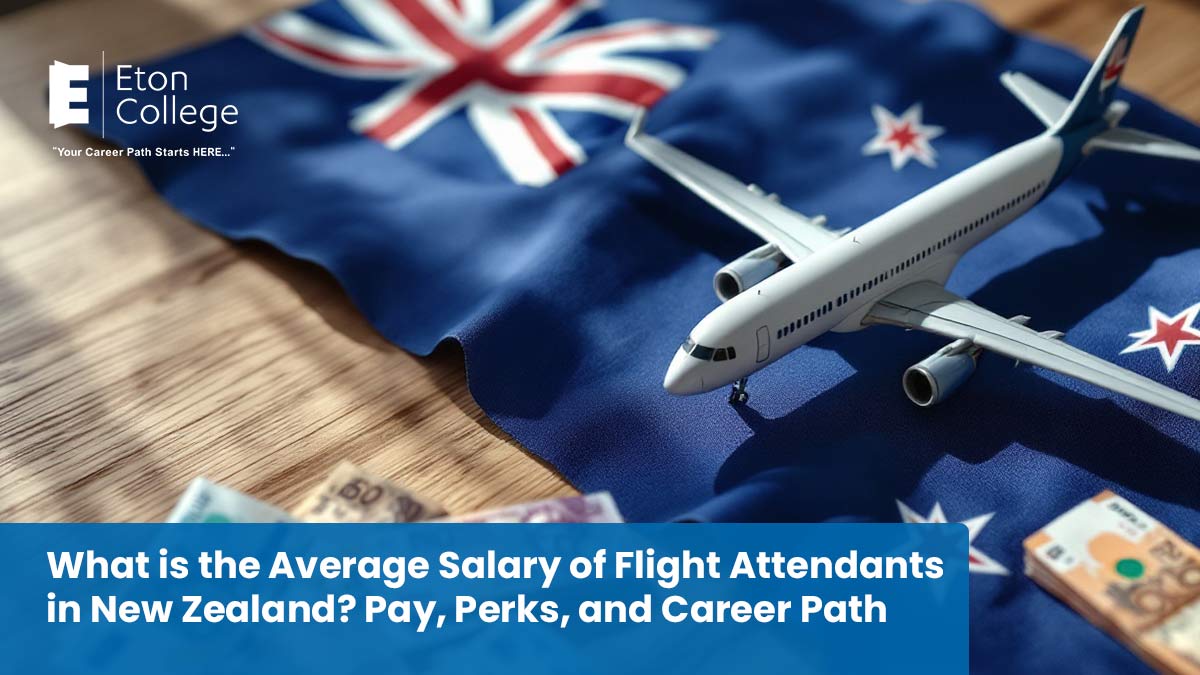- Flight attendants in New Zealand typically earn between NZD 54,000 and NZD 90,000 per year.
- Additional allowances for meals, accommodation, uniforms, and grooming are often provided, along with healthcare benefits, making this a highly attractive career.
- The job market is competitive, with limited opportunities, making specialized training essential for aspiring flight attendants.
Working as a flight attendant in New Zealand offers an exciting career in the skies, complete with perks like travel, customer interaction, and the opportunity to explore diverse locations. In this role, known locally as “Tūmau Waka Rererangi,” flight attendants are tasked with ensuring passenger safety and comfort, making it both a challenging and rewarding position.
Let’s see here the typical salaries, benefits, career paths, and how specialized programs can prepare you for a successful start in this field.
Average Salary of Flight Attendants in New Zealand
The flight attendant salary in New Zealand can vary widely based on factors such as experience level, flight routes, and the airline. On average, flight attendants in New Zealand earn between NZD 54,000 to NZD 90,000 per year, with some salaries extending from NZD 48,000 up to NZD 120,000 for those with extensive experience or specialized roles (TEC research). The base pay can fluctuate depending on factors such as seniority and whether the flight attendants work on domestic routes, trans-Tasman flights, or international journeys. Flight attendants can also benefit from various allowances, including meal, accommodation, uniform, and grooming stipends.
For newcomers, the entry-level salary starts around NZD 41,600, which reflects less than a year of experience. As they gain experience, early-career attendants (1-4 years) can earn about NZD 43,862. The salary continues to grow in mid-career (5-9 years) to approximately NZD 47,500, while experienced attendants (10-19 years) may receive around NZD 45,316. These earnings provide a solid foundation for flight attendants as they grow within the industry and acquire specialized skills.
Perks and Benefits for Flight Attendants in New Zealand
Flight attendants enjoy various perks and benefits that enhance their lifestyle and work experience. Some common perks include:
- Travel and Accommodation Allowances: Most airlines cover expenses for meals, accommodations, and travel while on duty, especially for international routes.
- Uniform and Grooming Allowances: Airlines generally provide uniforms and may offer grooming allowances, ensuring attendants maintain a professional appearance.
- Health Benefits: Approximately 63% of flight attendants receive medical benefits, and 25% have dental benefits, making it easier to maintain health while managing a demanding work schedule.
Job Outlook and Career Path for Flight Attendants in New Zealand
Flight attendants typically have a range of career progression options. Some common career paths include moving into roles such as:
- Cabin Supervisor: Overseeing a team of flight attendants and ensuring all safety procedures and customer service standards are met.
- Office Administrator or Manager: Many attendants use their organizational and people skills to transition into administrative roles within airlines.
- Executive Assistant: With their attention to detail and customer service skills, some flight attendants move into executive support roles.
Key Skills Required for Flight Attendants in New Zealand
- Emergency Procedures and Equipment: Knowledge of flight protocols, emergency procedures, and operation of equipment like defibrillators is critical.
- Hospitality and Customer Service: Flight attendants must be skilled in serving food and drinks, ensuring passengers are comfortable, and addressing any needs or concerns.
- First Aid and Medical Skills: Since they may need to handle medical situations, first-aid skills are crucial to assisting sick or injured passengers.
- Communication and Teamwork: Working with both passengers and fellow crew members requires excellent communication and collaboration skills.
- Flexibility and Stress Management: Working in confined spaces, dealing with turbulence, and managing irregular sleep schedules can be challenging. Attendants need to be resilient and adaptable to handle such demands.
Working Conditions for Flight Attendants
Flight attendants in New Zealand must be prepared for irregular work hours, including nights, weekends, and holidays. For international flights, they may spend days away from home, working shifts that can extend up to 18 hours. Additionally, high-altitude work in confined spaces can affect sleep patterns and require attendants to maintain a healthy lifestyle. As Jacqui Chapman advises, “This job does take a toll on your body and sleep. You need to be proactive about your diet and sleeping habits.”
How Eton College Prepares You for a Flight Attendant Career
Despite its perks, the job market for flight attendants in New Zealand can be competitive, with limited openings due to industry demands. This scarcity underscores the importance of obtaining high-quality training and certification, which can make a candidate stand out.
For those interested in becoming a flight attendant in New Zealand, Eton College offers a specialized Flight Attendant Preparation Program. This program equips aspiring attendants with all the necessary skills and certifications needed to excel in this competitive field. Eton College’s curriculum focuses on practical training, covering everything from customer service to emergency response, which are vital for handling real-life situations in-flight. By enrolling in this program, students can gain a competitive edge, making them ideal candidates for entry-level positions in New Zealand and beyond.
A career as a flight attendant is rewarding yet demanding. Those who thrive in this field are individuals who enjoy dynamic work environments, love to travel, and can handle physical challenges. With the flight attendant salary in New Zealand offering a comfortable income, combined with additional perks and the potential for career progression, it’s a compelling option for many. However, with job opportunities being limited, pursuing professional training, like Eton College’s program, is a strategic way to stand out and increase your chances of success.
FAQs
- What is the average salary of a flight attendant in New Zealand?
Flight attendants in New Zealand earn between NZD 54,000 and NZD 90,000 per year, with some experienced attendants earning up to NZD 120,000 annually, depending on their role and flight routes. - Do flight attendants in New Zealand receive additional perks?
Yes, flight attendants often receive allowances for meals, accommodation, uniforms, and grooming. Many also receive healthcare benefits, making the position financially attractive. - What qualifications are needed to become a flight attendant in New Zealand?
Flight attendants need training in emergency procedures, customer service, and first aid. They should also be able to handle the demands of shift work and long hours. Eton College’s Flight Attendant Preparation Program offers comprehensive training to meet these requirements. - What career paths are available for flight attendants after gaining experience?
Flight attendants can move into roles such as cabin supervisor, office manager, or executive assistant within the airline industry, opening doors to various administrative and managerial positions. - How can Eton College help me become a flight attendant in New Zealand?
Eton College’s Flight Attendant Preparation Program provides essential training, covering areas like customer service, safety procedures, and first aid, which help graduates become ideal candidates for flight attendant positions in New Zealand.




